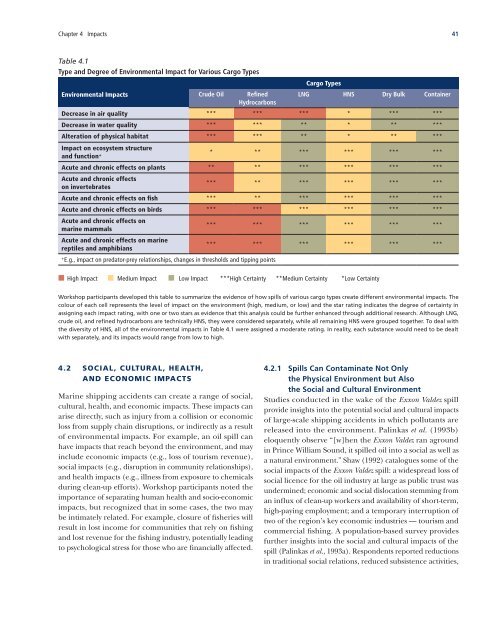Commercial Marine Shipping Accidents Understanding Risks Canada
cca_marine_shipping_risks_en_fullreport
cca_marine_shipping_risks_en_fullreport
Create successful ePaper yourself
Turn your PDF publications into a flip-book with our unique Google optimized e-Paper software.
Chapter 4 Impacts<br />
41<br />
Table 4.1<br />
Type and Degree of Environmental Impact for Various Cargo Types<br />
Environmental Impacts Crude Oil Refined<br />
Hydrocarbons<br />
Cargo Types<br />
LNG HNS Dry Bulk Container<br />
Decrease in air quality *** *** *** * *** ***<br />
Decrease in water quality *** *** ** * ** ***<br />
Alteration of physical habitat *** *** ** * ** ***<br />
Impact on ecosystem structure<br />
and function +<br />
* ** *** *** *** ***<br />
Acute and chronic effects on plants ** ** *** *** *** ***<br />
Acute and chronic effects<br />
on invertebrates<br />
*** ** *** *** *** ***<br />
Acute and chronic effects on fish *** ** *** *** *** ***<br />
Acute and chronic effects on birds *** *** *** *** *** ***<br />
Acute and chronic effects on<br />
marine mammals<br />
*** *** *** *** *** ***<br />
Acute and chronic effects on marine<br />
reptiles and amphibians<br />
*** *** *** *** *** ***<br />
+<br />
E.g., impact on predator-prey relationships, changes in thresholds and tipping points<br />
■ High Impact ■ Medium Impact ■ Low Impact ***High Certainty **Medium Certainty *Low Certainty<br />
Workshop participants developed this table to summarize the evidence of how spills of various cargo types create different environmental impacts. The<br />
colour of each cell represents the level of impact on the environment (high, medium, or low) and the star rating indicates the degree of certainty in<br />
assigning each impact rating, with one or two stars as evidence that this analysis could be further enhanced through additional research. Although LNG,<br />
crude oil, and refined hydrocarbons are technically HNS, they were considered separately, while all remaining HNS were grouped together. To deal with<br />
the diversity of HNS, all of the environmental impacts in Table 4.1 were assigned a moderate rating. In reality, each substance would need to be dealt<br />
with separately, and its impacts would range from low to high.<br />
4.2 SOCIAL, CULTURAL, HEALTH,<br />
AND ECONOMIC IMPACTS<br />
<strong>Marine</strong> shipping accidents can create a range of social,<br />
cultural, health, and economic impacts. These impacts can<br />
arise directly, such as injury from a collision or economic<br />
loss from supply chain disruptions, or indirectly as a result<br />
of environmental impacts. For example, an oil spill can<br />
have impacts that reach beyond the environment, and may<br />
include economic impacts (e.g., loss of tourism revenue),<br />
social impacts (e.g., disruption in community relationships),<br />
and health impacts (e.g., illness from exposure to chemicals<br />
during clean-up efforts). Workshop participants noted the<br />
importance of separating human health and socio-economic<br />
impacts, but recognized that in some cases, the two may<br />
be intimately related. For example, closure of fisheries will<br />
result in lost income for communities that rely on fishing<br />
and lost revenue for the fishing industry, potentially leading<br />
to psychological stress for those who are financially affected.<br />
4.2.1 Spills Can Contaminate Not Only<br />
the Physical Environment but Also<br />
the Social and Cultural Environment<br />
Studies conducted in the wake of the Exxon Valdez spill<br />
provide insights into the potential social and cultural impacts<br />
of large-scale shipping accidents in which pollutants are<br />
released into the environment. Palinkas et al. (1993b)<br />
eloquently observe “[w]hen the Exxon Valdez ran aground<br />
in Prince William Sound, it spilled oil into a social as well as<br />
a natural environment.” Shaw (1992) catalogues some of the<br />
social impacts of the Exxon Valdez spill: a widespread loss of<br />
social licence for the oil industry at large as public trust was<br />
undermined; economic and social dislocation stemming from<br />
an influx of clean-up workers and availability of short-term,<br />
high-paying employment; and a temporary interruption of<br />
two of the region’s key economic industries — tourism and<br />
commercial fishing. A population-based survey provides<br />
further insights into the social and cultural impacts of the<br />
spill (Palinkas et al., 1993a). Respondents reported reductions<br />
in traditional social relations, reduced subsistence activities,


